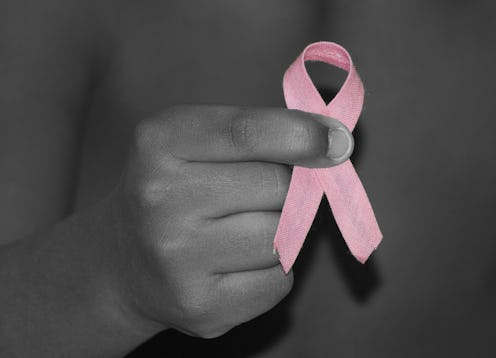News
Is It Moral To Read Tweets About Suffering?

Eight years ago, when Twitter's 500 million registered users were but a twinkle in its creators' imaginations, the aim of the site, says co-founder Jack Dorsey, was to share "a short burst of inconsequential information." Creating a social media platform that would allow users to detail their terminal illness was certainly not on the agenda. Yet that's exactly what Lisa Bonchek Adams, who has Stage IV breast cancer, is using Twitter for. And the ethics of her tweeting — and our reading those tweets — poses a unique, modern morality conundrum.
Adams may have a mere 7,650 followers — small fry by some standards — but she is a prolific user, having tweeted more than 165,000 times about her demise over the course of seven years. As to be expected, these are some of the most intimate 140-character messages anyone could care to read about another human being. The tweets are as mentally and emotionally invasive as the medical treatment she is receiving to tackle the cancer (which has now spread to her bones, joints, hips, liver, lungs and spine) is to her physical body.
Aside from exercising her First Amendment rights, Adams says the tweeting helps distract her from the pain. It also gives her a positive purpose by allowing her to educate others about an illness that will affect 1 in 8 women in the US.
Is the problem, then, not with how Adams tweets about her illness, but how — and why— we might read about it? After all, whether it be our morbid interest in former beauty queen murders, or our penchant for scrutinizing a star's road to rehab, we humans are an imprudent lot, with an insatiable appetite for details about the lives of others — particularly when things are going wrong. Perhaps what makes us really uncomfortable about Adams' Twitter feed is that, for some of us, it makes for compulsive yet conflicted reading. Are we reading to understand or to be macabrely entertained?
Of course, Adams isn't the first woman to have tweeted about her an intimate bodily experience in a way that raises ethical issues. Back in 2009, social networking site manager Penelope Trunk hit the headlines when she tweeted: "I'm in a board meeting. Having a miscarriage. Thank goodness, because there's a fucked-up three-week hoop-jump to have an abortion in Wisconsin." Trunk was roundly condemned for her divulgence but she robustly defended herself in a piece for the Guardian:
"If you insist on keeping the word private, you force the experience of women back into darkness. If you start telling women which media is appropriate for which emotion, you undermine the progress we make."
Given the strictures and censure of women's bodies and their experiences of them over the years, can Adams' tweeting about her breast cancer be read as, not just a human right to self-expression, but a kind of feminist act?
Polite society may have taught us it's rude to stare, especially in the face of others' misfortune, but Adams' graphic candor offers us a unique opportunity to empathize with an experience — having cancer — that will affect so many of us, but which remains by and large taboo to discuss. If anything, Adams is actually doing a public service to health information by writing so cogently and so openly about her illness. And guess what—if you don't like it, or it's not to your taste, you don't have to follow Adams on Twitter.
Image: Fotolia